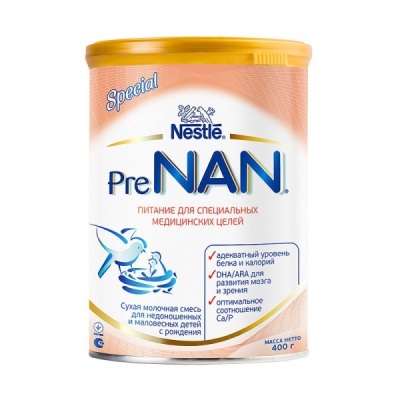Blends for premature babies
Nutrition of a premature baby should be given special attention, since weight gain by premature babies is one of the main tasks in nursing such babies.
If the mother did not manage to establish breastfeeding, the baby needs to find a mixture that can cover all the needs of the little ones in nutrients in order to ensure a quick weight gain. And therefore, for premature babies, as well as for small babies, special nutrition has been developed. How does it differ from mixtures for newborns and how to choose the best mixture for babies?
Feeding methods
Premature babies are fed in the hospital and hospital with the following methods:
- Parenteral Nutrients are injected into the baby through the veins, for example, glucose, solutions of proteins and vitamins.
- Through the probe. Such nutrition is long (carried out using an infusion pump) and in portions (performed with a syringe).
- Breast milk. Mom can breastfeed the baby or give the toddler expressed milk from a bottle.
- From the bottle mixture. With this feeding, the baby gets a special mix.
Many babies are given full parenteral nutrition immediately after birth, and enteral nutrition is gradually added to support the work of the gastrointestinal tract (probe). Its volume is slowly increased, eventually replacing the probe with a bottle. Babies with a weight of 1.8-2 kg are given a trial from a bottle, but in a situation with weak sucking activity they return to tube feeding in portions (via a syringe).
Features mixtures for preterm
- The energy value of such mixtures is increased and averages 80 kcal per 100 ml.
- The amount of protein in premature babies mixtures has been increased to 1.9-2.6 g per 100 ml of product.
- The ratio of protein fractions (casein to whey proteins) is as close as possible to the composition of breast milk and in most products is 40:60.
- The amount of fat in the mixtures also increased to 3.9-4.3 g in 100 ml of the finished mixture.
- Arachidonic and docosahexaenoic acids must be present in the composition of fat mixtures for premature babies, since they are synthesized in limited quantities in the body of immature babies.
- About 20-40% of the fat composition of the mixtures are medium chain triglycerides, which help the absorption of fat. These compounds also improve the absorption of zinc and calcium.
- There are more carbohydrates in babies' pre-term infant formulas, while the amount of lactose is somewhat reduced to eliminate the strong load on the digestive tract of babies. In some products, lactose is replaced by dextrin maltose or polysaccharides.
- L-carnitine, which is a vitamin-like compound important for the metabolism of fats, is added to all the mixtures.
- Adding nucleotides to the mixture helps stimulate somatic growth as well as strengthen the immune system. These compounds have a positive effect on intestinal maturation and the formation of the gastrointestinal microflora.
- The vitamin-mineral composition of the mixtures is adapted to the needs of the premature infant - they contain more iron and calcium, the amount of vitamins D, E and C is increased. The ratio of copper to zinc is 10 to 1, and the ratio of calcium to phosphorus is 2 to 1.
- Some blends contain dietary fiber in the form of galacto-oligosaccharides. They stimulate the growth of bifidobacteria.
- The osmolality of the mixtures for premature babies is rather high due to the high concentration of nutrients, therefore, when the infant reaches 2.5-3 kg, it is recommended to convert it to standard mixtures.
Mix overview
|
Benefits and features |
disadvantages |
|
Nutrilon Pre |
|
|
Optimally balanced product for preterm. Good calcium to phosphorus ratio. High in vitamin E, iron and calcium. The composition contains nucleotides and prebiotics. Sweet taste that kids like. |
Non-optimal ratio of zinc and copper. Often causes colic and constipation. |
|
Friso Pre |
|
|
It has a unique composition of amino acids, contributing to the maturation of the gastrointestinal tract and the nervous system. The optimal composition of carbohydrates. Helps to normalize the rhythm of wakefulness and sleep. The composition included nucleotides. Contains a lot of iodine. Does not cause allergies. Helps to cope with colic and constipation. |
Contains little iron and zinc. Osmolality increased. Contains Palm oil. There are no medium chain triglycerides. It has a not very pleasant smell and taste. Sometimes causes regurgitation. Expensive. |
|
Nan Pre |
|
|
Good composition of fats. Contains an increased amount of whey proteins (70%). Proteins in the composition of this mixture are partially hydrolyzed, therefore, easier to digest. Children eat with pleasure. The mixture is classified as hypoallergenic. |
Non-optimal ratio of copper to zinc. In the composition there is palm oil. High price. |
|
Similak Neoshur |
|
|
Contains medium chain triglycerides. It contains a lot of copper, iodine, vitamin A and vitamin E. Includes nucleotides. Does not contain palm oil. |
High price. Difficult to find on sale. Sometimes it causes allergies. |
|
Bellakt |
|
|
The mixture is well adapted to the needs of children with low weight. It contains nucleotides. The composition of vitamins in such a mixture is optimal for the prevention of respiratory disorders. Affordable price. |
Contains quite a lot maltodextrin. |
|
Nutrilak Pre |
|
|
The composition is well adapted for children with low weight. In the mixture there are a lot of easily absorbed fats. The ratio of proteins is optimal. Contains lots of vitamin E and folic acid. |
Osmolality slightly increased. In the composition there is palm oil. It contains little calcium and iron, as well as phosphorus. |
|
Humana 0 |
|
|
Differs in good learning. Contains prebiotics, thereby improving the digestive tract and strengthens the immune system. The carbohydrate component is represented only by lactose. Helps normalize stools and eliminate colic. |
Expensive. Sometimes causes constipation. |
|
Enfamil Prematura |
|
|
It has a low osmolality, so it does not harm the kidneys. As part of no palm oil. Contains a lot of vitamin E and iron. Does not cause allergies and digestive problems. Can be prepared in several dilutions - from 67 kcal per 100 ml (standard dilution), from 81 kcal per 100 ml and from 40 kcal per 100 ml of product. |
The ratio of calcium to phosphorus is not optimal. |
|
Hipp Pre |
|
|
As close as possible to the composition of human milk. Does not contain sugar. Taste like kids. Does not provoke colic and allergies. |
Differs in low caloric content (only 65 kcal per 100 ml). The non-optimal ratio of zinc to copper and phosphorus to calcium. Occasionally causes constipation. The weight of this mixture is typed more slowly. |
|
Alprem |
|
|
The mixture is rich in iron. It has a good fat composition. |
Caloric content is only 70 kcal per 100 ml. A small amount of vitamins, iodine and calcium. Not all children like the taste. |
Which mixture is better to choose?
First of all, the child's weight is taken into account, since there are mixtures recommended for those weighing less than 1800 g (Friso Pre, Nutrilon Pre 0, Similac special care). If a child weighs more than 1800 g, he can be given a mixture of Similac Neoshur, Nutrilon Pre 1, Nan Pre, Nutrilak Pre.
As for the rest, it is very difficult to say which mixture for an infant will be the best, because each baby reacts to food individually.For example, in one baby, the mixture may cause constipation, and the same mixture does not interfere with the digestion of another child.
How much should the premature baby eat?
A premature baby should receive food 7-8 times a day with breaks of about 3 hours. Calculating the volume of the mixture, first of all take into account its caloric content.
Baby should receive a day:
|
Baby age |
The number of calories per kilogram of weight |
|
First day |
30 |
|
Second day |
40 |
|
The third day |
50 |
|
Fourth day |
60 |
|
Fifth to sixth day |
80 |
|
Seventh-ninth day |
90 |
|
Tenth to fourteenth day |
100-120 |
|
Fifteenth day and beyond |
130 |
Feeding with special mixtures is continued until the moment when the baby gains weight of 3000 g. Next, during the month, the baby is transferred to the usual mixture for full-term babies.
If it is necessary (the child was born very premature, it is not gaining weight well), one or two feeds for the premature infants can remain in the baby’s diet for several months.














